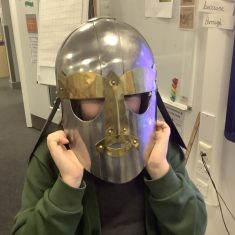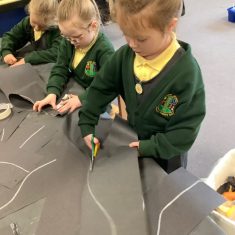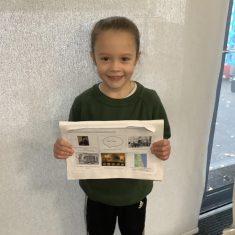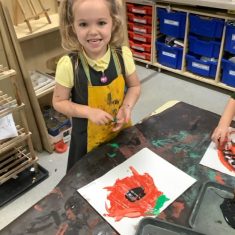Our Vision

Mrs Jennings – Year 6c Teacher / History Lead
During a child’s education at Harlow Green Primary, our aim is that history will stimulate and interest children, and therefore, develop their understanding about people and periods from the past. Through our curriculum the children to understand and appreciate how the past has influenced their own lives and modern day living. Children will learn the skills to be a good historian, how to research and gather information, develop their skills of enquiry and analysis as well as starting to question information gathered and its reliability. We give the children opportunities to investigate past events and, by doing so, to develop the skills of enquiry, analysis, interpretation and problem-solving. Children will learn about significant periods in history and famous people from the past as well as the history of the local area. Through a sequence of lessons based around key periods, people and the local area, we aim for the children to become more curious and inquisitive about the past and to ask perceptive questions and think critically.
By the end of the children’s historical journey, our vision is that they shall have an understanding of their own identity and a sense of belonging which only history can provide. We believe that they shall leave Harlow Green with an enquiring mind that has developed a chronological knowledge of key historical periods and facts, combined with knowledge of significant individuals who have helped shape society as it is today. We aim for this knowledge to help the children make more informed life choices and aspire to be open-minded citizens who will make valuable contributions to society.
Aims
The national curriculum for history aims to ensure that all pupils:
- know and understand the history of these islands as a coherent, chronological narrative, from the earliest times to the present day: how people’s lives have shaped this nation and how Britain has influenced and been influenced by the wider world
- know and understand significant aspects of the history of the wider world: the nature of ancient civilisations; the expansion and dissolution of empires; characteristic features of past non-European societies; achievements and follies of mankind
- gain and deploy a historically grounded understanding of abstract terms such as ‘empire’, ‘civilisation’, ‘parliament’ and ‘peasantry’
- understand historical concepts such as continuity and change, cause and consequence, similarity, difference and significance, and use them to make connections, draw contrasts, analyse trends, frame historically-valid questions and create their own structured accounts, including written narratives and analyses
- understand the methods of historical enquiry, including how evidence is used rigorously to make historical claims, and discern how and why contrasting arguments and interpretations of the past have been constructed
- gain historical perspective by placing their growing knowledge into different contexts, understanding the connections between local, regional, national and international history; between cultural, economic, military, political, religious and social history; and between short- and long-term timescales.
Key Stage 1
Pupils should develop an awareness of the past, using common words and phrases relating to the passing of time. They should know where the people and events they study fit within a chronological framework and identify similarities and differences between ways of life in different periods. They should use a wide vocabulary of everyday historical terms. They should ask and answer questions, choosing and using parts of stories and other sources to show that they know and understand key features of events. They should understand some of the ways in which we find out about the past and identify different ways in which it is represented.
In planning to ensure the progression described above through teaching about the people, events and changes outlined below, teachers are often introducing pupils to historical periods that they will study more fully at key stages 2 and 3.
Pupils should be taught about:
- changes within living memory. Where appropriate, these should be used to reveal aspects of change in national life
- events beyond living memory that are significant nationally or globally
- the lives of significant individuals in the past who have contributed to national and international achievements. Some should be used to compare aspects of life in different periods
- significant historical events, people and places in their own locality.
Key Stage 2
Pupils should continue to develop a chronologically secure knowledge and understanding of British, local and world history, establishing clear narratives within and across the periods they study. They should note connections, contrasts and trends over time and develop the appropriate use of historical terms. They should regularly address and sometimes devise historically valid questions about change, cause, similarity and difference, and significance. They should construct informed responses that involve thoughtful selection and organisation of relevant historical information. They should understand how our knowledge of the past is constructed from a range of sources.
In planning to ensure the progression described above through teaching the British, local and world history outlined below, teachers should combine overview and depth studies to help pupils understand both the long arc of development and the complexity of specific aspects of the content.
Pupils should be taught about:
- changes in Britain from the Stone Age to the Iron Age
- the Roman Empire and its impact on Britain
- Britain’s settlement by Anglo-Saxons and Scots
- the Viking and Anglo-Saxon struggle for the Kingdom of England to the time of Edward the Confessor
- a local history study
- a study of an aspect or theme in British history that extends pupils’ chronological knowledge beyond 1066
- the achievements of the earliest civilizations – an overview of where and when the first civilizations appeared and a depth study of one of the following: Ancient Sumer; The Indus Valley; Ancient Egypt; The Shang Dynasty of Ancient China
- Ancient Greece – a study of Greek life and achievements and their influence on the western world
- a non-European society that provides contrasts with British history – one study chosen from: early Islamic civilization, including a study of Baghdad c. AD 900; Mayan civilization c. AD 900; Benin (West Africa) c. AD 900-1300.






